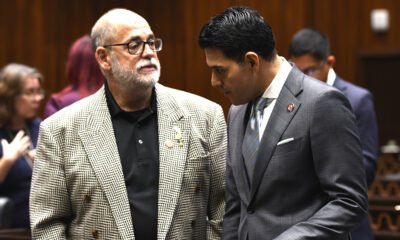Features
Local Schools Face Tough Times as Federal Funding Slashed

During a public community impact hearing on March 5 at Central High School, Arizona Attorney General Kris Mayes listened as residents expressed concerns about federal job cuts and funding reductions affecting their lives. Among them was Michael Robert, superintendent of the Osborn School District, accompanied by board members and a teacher.
Robert addressed the assembly regarding the Teacher and School Leader Incentive Program, which the district had participated in until its abrupt termination a few weeks prior. “The goal of this grant is to ensure that every student, regardless of their background or ZIP code, has access to an excellent education,” he stated. This program was crucial for Osborn, facilitating professional development opportunities through Master Teachers who support educators with classroom strategies and collaborative efforts.
The three-year program, funded by a $3 million grant from the National Institute for Excellence in Teaching, was abruptly halted on February 18 by the Department of Education, leaving Osborn with a significant gap in funding. “The letter we received cited diversity, equity, and inclusion, claiming our grant contradicted federal DEI priorities,” Robert explained. He expressed concern that the letter lacked evidence connecting the grant to DEI issues and emphasized that the focus remained on educational excellence and student achievement.
The cancellation places Osborn’s district, which serves 2,500 students across six schools, in a challenging situation. “We’re facing a loss of five-and-a-half teaching positions and one administrative position tied to the grant,” Robert detailed. Although they managed to reallocate one-and-a-half positions, four teachers and one administrator were affected in their recent board meeting.
Additionally, Robert raised alarms about potential federal moves to diminish or eliminate the Department of Education altogether. He acknowledged that while the district relies on federal funding, most support comes from state and local sources. However, cuts to the Department of Education could have far-reaching implications. “Elimination would signify a shift in national priorities concerning education. The department is vital in addressing opportunities for underrepresented communities and ensuring compliance with the Individuals with Disabilities Education Act,” he said.
Robert contrasted current sentiments about dismantling the department with the bipartisan consensus established when it was created in 1979, recognizing the necessity of federal oversight in educational matters. At a press conference on March 20, former President Trump announced intentions to shut down the Department of Education while pledging to safeguard certain funding provisions. Robert responded, “States and districts already possess substantial control over education. What we need is the stability and support that the federal government provides.”
Amid these developments, Arizona schools face ongoing funding challenges, with Robert stressing the necessity for more resources to improve educational outcomes. “Investing adequately in education is crucial; it not only aids student learning but also stimulates economic growth by fostering a well-trained workforce,” he remarked.
Despite uncertainties surrounding federal education policy, Robert reassured stakeholders that the Osborn School District remains committed to delivering quality education. “Our community supports our schools robustly, with significant voter backing for funding measures,” he noted. “We are committed to fiscal responsibility to ensure the best educational environment for our students.”


















